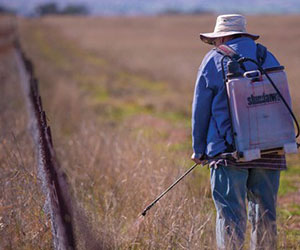Authors: Katherina Ng, Bo Raphael, Luke Maloney, Jessica Evans and Sandra Parsons
Overview

National coordination of weeds data is a priority for all levels of government in Australia and is established in national policy documents such as the Australian Weeds Strategy (AWS) 2017–2027, the Intergovernmental Agreement on Biosecurity (IGAB), and the national strategies for Weeds of National Significance (WoNS). ABARES conducted a national survey of state, territory and Natural Resource Management (NRM) institutional stakeholders to understand the status of weeds data collection and sharing, and identify opportunities for national data coordination. This report presents results of responses from over two thirds of NRM regions and from state and territory agencies representing all jurisdictions.
Key issues

- The national weeds data collection survey provided an understanding of the state of weeds data in Australia, including for nationally listed Weeds of National Significance, National Environmental Alert weeds and Agricultural Sleeper Weeds
- Responses to the survey indicate that a range of data on established and emerging weeds are being collected, maintained and used extensively by different agencies for their region.
- Both state and territory and NRM respondents reported availability of funding and human resources as key barriers to collecting weeds data.
- A key driver to data sharing for both respondent types is the coordinated management requiring shared data, as well as having an engaged community of people willing to share data. Reported barriers to data sharing were mainly inadequate resourcing, lack of data availability/quality and data confidentiality.
- Weed stakeholders showed keen interest in sharing their insights on, and contributing to, nationally coordinated weed management efforts. This is encouraging and suggests that there are significant opportunities to engage stakeholders in efforts toward the coordination of weeds datasets that would provide a consistent, national view of the status of weeds in Australia.
